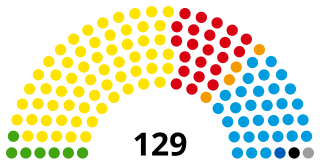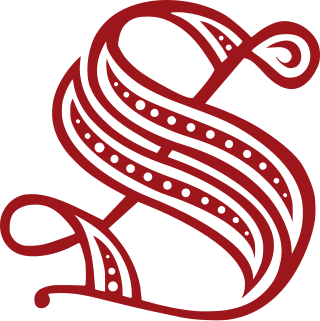
The House of Lords is the upper house of the Parliament of the United Kingdom. Like the lower house, the House of Commons, it meets in the Palace of Westminster in London, England. One of the oldest institutions in the world, its origins lie in the early 11th century and the emergence of bicameralism in the 13th century.

The House of Commons is the lower house of the Parliament of the United Kingdom. Like the upper house, the House of Lords, it meets in the Palace of Westminster in London, England. The House of Commons is an elected body consisting of 650 members known as members of Parliament (MPs), who are elected to represent constituencies by the first-past-the-post system and hold their seats until Parliament is dissolved.

The Parliament of the United Kingdom of Great Britain and Northern Ireland is the supreme legislative body of the United Kingdom, and may also legislate for the Crown Dependencies and the British Overseas Territories. It meets at the Palace of Westminster in London. Parliament possesses legislative supremacy and thereby holds ultimate power over all other political bodies in the United Kingdom and the Overseas Territories. While Parliament is bicameral, it has three parts: the sovereign, the House of Lords, and the House of Commons. The three parts acting together to legislate may be described as the King-in-Parliament. The Crown normally acts on the advice of the prime minister, and the powers of the House of Lords are limited to only delaying legislation.

The Scottish Parliament is the devolved, unicameral legislature of Scotland. Located in the Holyrood area of the capital city, Edinburgh, it is frequently referred to by the metonym Holyrood. The Parliament is a democratically elected body comprising 129 members known as Members of the Scottish Parliament (MSPs), elected for five-year terms under the regionalised form of additional member system (MMP): 73 MSPs represent individual geographical constituencies elected by the plurality (first-past-the-post) system, while a further 56 are returned as list members from eight additional member regions. Each region elects seven party-list MSPs. Each region elects 15 to 17 MSPs in total. The most recent general election to the Parliament was held on 6 May 2021, with the Scottish National Party winning a plurality.

A veto is a legal power to unilaterally stop an official action. In the most typical case, a president or monarch vetoes a bill to stop it from becoming law. In many countries, veto powers are established in the country's constitution. Veto powers are also found at other levels of government, such as in state, provincial or local government, and in international bodies.
An act of parliament, as a form of primary legislation, is a text of law passed by the legislative body of a jurisdiction. In most countries with a parliamentary system of government, acts of parliament begin as a bill, which the legislature votes on. Depending on the structure of government, this text may then be subject to assent or approval from the executive branch.
A private member's bill is a bill introduced into a legislature by a legislator who is not acting on behalf of the executive branch. The designation "private member's bill" is used in most Westminster system jurisdictions, in which a "private member" is any member of parliament (MP) who is not a member of the cabinet (executive). Other labels may be used for the concept in other parliamentary systems; for example, the label member's bill is used in the Scottish Parliament and the New Zealand Parliament, the term private senator's bill is used in the Australian Senate, and the term public bill is used in the Senate of Canada. In legislatures where the executive does not have the right of initiative, such as the United States Congress, the concept does not arise since bills are always introduced by legislators.

The Scotland Act 1998 is an Act of the Parliament of the United Kingdom which legislated for the establishment of the devolved Scottish Parliament with tax varying powers and the Scottish Government. It was one of the most significant constitutional pieces of legislation to be passed by the UK Parliament between the passing of the European Communities Act in 1972 and the European Union (Withdrawal) Act in 2018 and is the most significant piece of legislation to affect Scotland since the Acts of Union in 1707 which ratified the Treaty of Union and led to the disbandment of the Parliament of Scotland.
A bill is a proposal for a new law, or a proposal to significantly change an existing law. A bill does not become law until it is passed by the legislature and has been, in most cases, approved by the executive. Once a bill has been enacted into law by the legislature, it is called an act of the legislature, or a statute. Bills are introduced in the legislature and are discussed, debated and voted upon.

The Italian Parliament is the national parliament of the Italian Republic. It is the representative body of Italian citizens and is the successor to the Parliament of the Kingdom of Sardinia (1848–1861), the Parliament of the Kingdom of Italy (1861–1943), the transitional National Council (1945–1946) and the Constituent Assembly (1946–1948). It is a bicameral legislature with 600 elected members and a small number of unelected members. The Italian Parliament is composed of the Chamber of Deputies, as well as the Senate of the Republic.
This is a brief description of the lawmaking procedure in India.

The Parliament of Grenada is composed of the monarch and two chambers: the Senate and the House of Representatives. It operates from the New Parliament Building in St. George's.

Joseph Martin FitzPatrick is a Scottish politician who most recently served as Minister for Local Government Empowerment and Planning from March 2023 to May 2024. A member of the Scottish National Party (SNP), he has been the Member of the Scottish Parliament (MSP) for Dundee City West since the 2007. Prior to his most recent Ministerial appointment, he was Convener of the Scottish Parliament's Equalities, Human Rights and Civil Justice Committee. He served as Minister for Public Health, Sport and Wellbeing from 2018 to until his resignation in 2020. He also served as Minister for Parliamentary Business from 2012 to 2018.

An Act of Parliament in the United Kingdom is primary legislation passed by the UK Parliament in Westminster, London.
In the UK and certain other Commonwealth countries, King's Consent is a parliamentary convention under which Crown consent is sought whenever a proposed parliamentary bill will affect the Crown's own prerogatives or interests. Prince's Consent is a similar doctrine, under which consent of the Prince of Wales must be obtained for matters relating to the Duchy of Cornwall. King's or Prince's Consent must be obtained early in the legislative process, generally before parliament may debate or vote on a bill. In modern times, following the tenets of constitutional monarchy, consent is granted or withheld as advised by government.
Prostitution in Scotland has been similar to that in England under the State of Union, but since devolution, the new Scottish Parliament has pursued its own policies.

Local and personal acts are laws in the United Kingdom which apply to a particular individual or group of individuals, or corporate entity. This contrasts with a public general Act of Parliament (statute) which applies to the nation-state. Acts of Parliament can afford relief from another law; grant a unique benefit or, grant powers not available under the general law; or, relieve someone from legal responsibility for some allegedly wrongful act.
A private members' bill (PMB) in the Parliament of the United Kingdom is a type of public bill that can be introduced by either members of the House of Commons or House of Lords who are not Ministers. Less parliamentary time is given to such bills and as a result only a minority of PMBs actually become law. Such bills can be used however to create publicity for a cause or issue and can affect legislation indirectly.

The Marriage and Civil Partnership (Scotland) Act 2014 is an Act of the Scottish Parliament which allows same-sex couples to marry in Scotland since 16 December 2014.

An act of the Scottish Parliament is primary legislation made by the Scottish Parliament. The power to create acts was conferred to the Parliament by section 28 of the Scotland Act 1998 following the successful 1997 referendum on devolution.











